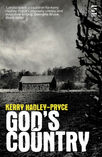Procrastination, Brick Walls and Transferring
- Kerry Hadley
- May 1, 2019
- 2 min read

Graeme Harper recently wrote: 'I'm not a procrastinator. I'm just extremely productive at unimportant things.' (Harper, 2019:2) Like him, I have not been procrastinating, I have not hit a wall or been 'blocked'. No. I have been being productive, I have been contemplating. Yesterday was my last day as a PhD candidate at the University of Wolverhampton. I have withdrawn and will re-commence in September at Manchester Metropolitan University. This was a very big decision, but now it's made and from today until September, I have freed myself from the obligation of research, and have cleared the decks for some serious writing before getting back down to it after the summer. But, creatively, I've done nothing on paper, so to speak, for months. So, it was interesting to read what Harper had to say about procrastination:
'As we further consider the ways we might better come to understand creative writing it seems certain that the topic of ‘procrastination’ will feature appear somewhere in discussions. In doing so, we can no doubt contribute to an understanding of what it is, how and when is occurs, for what reasons and to what ends. No doubt, we will discuss it specifically in relation to creative writing; but the ideas from that discussion will also contribute to the wider explorations and our discoveries might indeed encourage us to go beyond that specific instance to suggest general implications.
With all the complexity of creative writing as our guide, and as a wellspring of potential topics, this begs us to wonder what we might discover, specifically and more widely, in an exploration of structure or style, both as concepts and as practices; or in an examination of ‘contemplation’ or an investigation of ‘sequences of communication’ or of ‘acts of metaphoric examination’ or of ‘ideas about recording’? On the latter, how interesting might it be to compare types of human ‘recording’ from say, writing to audio, from etching to chemistry lab reports, and consider how ideas of recording are influenced or shaped by the imagination, by the discourse of the final texts envisioned, and by the audience for these final texts.' (Harper, 2019:1)
There's something in this, I can categorically say. Now that I have made decisions, walked dogs (two) for miles and miles, run for miles and miles, sat and thought - contemplated - for weeks, maybe a couple of months, only today, now, do I feel (what's the right word here?) ready? Clear-headed? Sharp enough? Probably all of those things. Because if there's one thing I've learnt it's this, and Harper would agree: procrastination is a bit of an umbrella term, really. And as creative writers, the critical examination of how we think, imagine or experience things (or life) is not something to get hung-up on, but these so-called 'laws of creative delay' (Harper, 2019:1) are part of the process. I referred to it today, talking to a poet who hasn't written anything for three months, yet has a title in his mind for his next work. 'It's percolating,'I said. 'You haven't hit a brick wall, or anything.' Philosophical, perhaps, but like Harper says, I'm extremely productive at unimportant things.
Harper, G. (2019) 'Procrastination', New Writing, 16:1, 1-2, DOI: 10.1080/14790726.2019.1562764









Comments